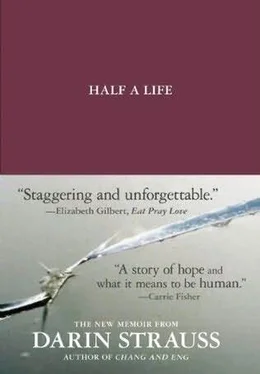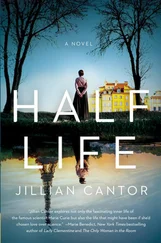A little later on, the date phoned me. She’d often thought of committing suicide in high school by swerving into oncoming cars, she said. This call was meant to be her apology.
“I came close a few times, usually when it was late,” she told me. “You know, headlights coming my way and I’m really depressed, nights like that.”
Martin Amis has written that we all hope, modestly enough, to get through life without being murdered. A lot more confidently, we hope to get through life without murdering anybody ourselves.
“All right,” I said to my date, just as I was hanging up the phone, because what else was there? I pictured a bicyclist on the edge of vision: the dark speck of Celine. “All right, then,” I said. “All right.”
“My ideas, my language, support me in the face of disastrous horror over and over.”
— Harold Brodkey
“I see here you went to Tufts,” a prospective employer would say.
“English major,” I’d tell the guy. “Concentration on creative writing.” (But would I get fired if this person finds out what I’ve done?)
“We cover the financial-technology beat,” the guy would say — turning over my scant resume, his face dimmed by boredom. “Nothing creative about the writing here , young man, I can tell you that.” He’d lean forward. “Can you go really, really non-creative?”
“I’ll ignore my finer instincts.” (But so, am I being ambitious enough for two lives? Is this a good enough job?)
As I moved into my late twenties, as I got to the bridge that would carry me to the thirties and beyond, I realized I’d absorbed Celine’s mother’s request. When I thought about her now, it was about trying to live well enough for two, successfully enough — with enough diversions, enough achievements — for us both. And Celine herself started coming with me, on job interviews, dates, everywhere. I thought of her each time I drove by a bicyclist. (Which happens a lot more often than you think. I’m guessing that’s not something most drivers register.)
Mrs. Zilke’s extracted promise felt immutable. Each equivocation and hedge, every dawdle, each dereliction and misdemeanor — all the human stuff of growing up — seemed to count against me on some celestial checklist. I’d later think of Celine at my wedding and when my wife told me that she was pregnant. Name an experience: it’s a good bet I’ve thought of Celine while experiencing it.
When I was twenty-eight, my hair went gray and I had stomach surgery. I’d been grinding out my insides. The squinch, the clench, had followed me from freshman year of college on. I was almost six-two and weighed a hundred and fifty-eight pounds. There’s only a certain amount of acid you can create before it starts consuming everything. I was eating myself from the inside.
New York’s best stomach surgeons — the surgeons you would want to cut you open, if such a cutting were called for — didn’t take insurance. So I had to settle. I needed a procedure called a Nissen fundoplication . This marries a fairly caveman straightforwardness to NASA-grade sophistication: a doctor manipulates two laparoscopic robot hands to tie your stomach around your gullet and stick it there. (When the tummy is pinned in the shape of a folded-up change purse, acid can’t spew back up the esophagus.) I had the surgery in 1998 at the one shitty local hospital that would take my shitty insurance, the Cabrini Medical Center.
Heading to one of Cabrini’s surgery theaters, I’d gotten stuck in a bizarre traffic jam; different hospital people wheeled me and two patients I’d never seen before to a bottleneck point (stretchered, gowned, at one of the obvious precipices of a life), and they simply left us there. Our gurneys lined up side-by-side, in a kind of vestibule. The scene felt ghostly and almost comic, a small-scale First Circle. I hadn’t eaten in twelve hours and, in my condition, every swallow came like an act of courage. We patients all raised our heads to look at one another — three men made of bedside promises, of cold feet, of life lurch. I was the youngest by fifty years. We each kept totally quiet, very somber. I remember the room as eye-stingingly bright. The other patients showed the frog spots and lack of vehemence that men often have in the last panels of their lives. The hospital went bankrupt pretty soon after this.
I don’t want to valorize anything. I don’t want to make this more than it was. No false drama: my stomach hurt, and then it didn’t. The Nissen fundoplication worked. I thought I’d been fixed for good, but this turned out to be not so. A few years later, I’d lost weight again. I found myself under that haze of mystery discomforts called IBS. It was pretty rough. And as soon as I had handled that , I suffered another murky ailment called CPPS (chronic pelvic pain syndrome). My internal climate was a hurricane alley. Emotions blew through, downing power lines, hefting cars onto roofs, destroying the finish. Low trees, dead wood thrown across traffic. That’s the force of guilt for you.
During the worst of this I was essentially alone. Then I met my wife.
“I want to tell you something,” I said to her, to the woman I’d ultimately marry.
“Tell me what?” Susannah said. This was several weeks into our romance. It must have been about a year after my stomach operation. I was standing at the farthest edge of the twenties, and the sad, steel-gray bridge I mentioned — the thirties and beyond — it wasn’t so bad once you looked at it. I was getting to know that most things, as you approached them, were like that. The scary thing about drawing near milestones was merely that you weren’t there yet. Once you arrived, they turned familiar — you were in the landscape. They could be dealt with.
Susannah said: “Something bad?” and I scooched around to find the carefree side of my chair.
I tried not to feel the two poles: the excitement of saying something that was sure to be a gongish way to get her attention, and the desire for it to be a less-than-cataclysmic admission. Every time it became social, it felt like a lie. So I tried to say it without having any emotions at all. Any emotion amounted to my playing a part, instead of simply being the part.
“Yeah,” I told Susannah. “It is a pretty bad thing I have to tell you.”
In some ways I remained like the guest arriving at a dinner party with an expensive wine bottle whose price tag has been left conspicuously unremoved. The me who still wanted the world to notice how upsetting this whole thing was, this core thing, pushed to the front of the line. 3“It is pretty bad,” I said.
It’s probably a testament to how Susannah took the news that I can’t actually remember what she said. It’s nice to think your spouse is better at emotions than you are: it’s a reminder of why you made the marriage. She probably didn’t say anything. She probably just nodded and let me talk. What I can picture is her look. The rational eyes, the quiet crimp to the brow, the sympathy flaming her cheek. It was this that decided me, that had me feeling normal and in love. I remember that her face just opened. I don’t know how else to describe it.
There are some people who seem tickled to take on your sad history as their own. It’s an object to cuddle and sculpt to their floating aspirations. They see a chance, in you, to be their best selves. You can be the prettying gleam they turn their profile toward. Susannah wasn’t like that. She didn’t fall into the easy and false posture: “Because you have brought me this problem, I am the expert, and it’ll be my opinion and solution you shall treasure.”
Susannah shook her head at moments of the story and at others just chewed the side of her own mouth affirmingly. I looked down a few times, when I came to parts about which I wasn’t sure I was expressing or even feeling honestly. And every time I turned back, her you’re-doing-great eyes were still on me. She may as well have had her hand over mine.
Читать дальше









